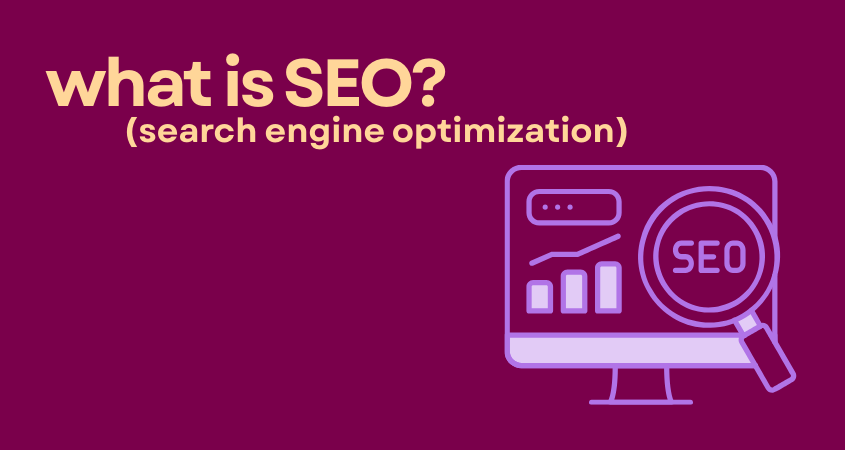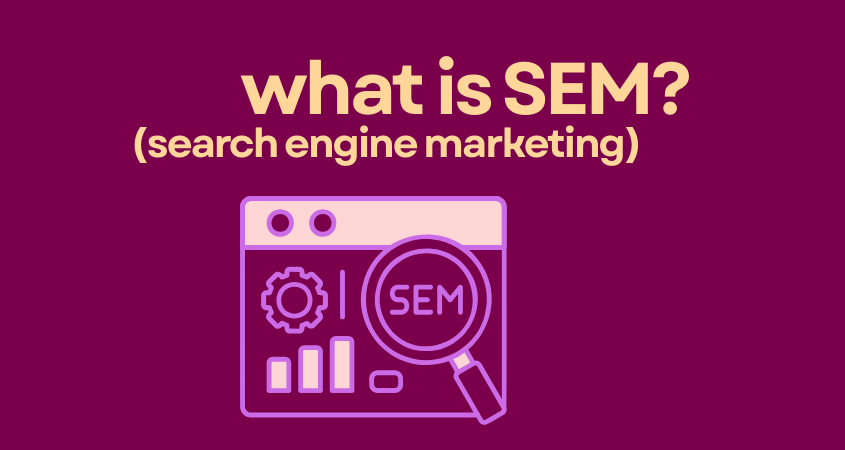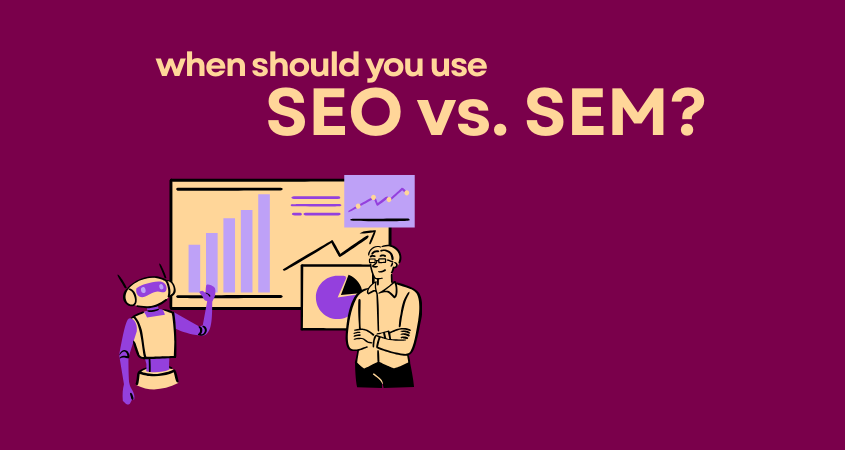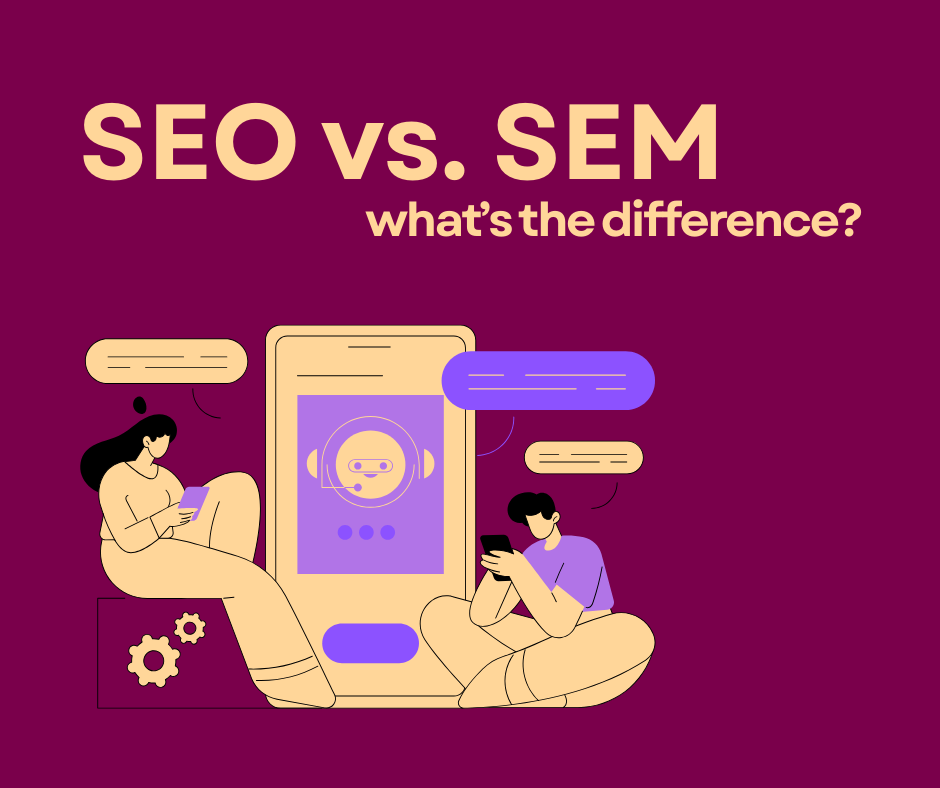When trying to grow your business, you may find it challenging to get your website to the front page.
Each search engine has a tool that ranks webpages based on their content and decides which pages to show to consumers.
That’s why search engine optimization and marketing are very important aspects if you want to succeed in the current competitive market.
In this blog, we’ll find out the difference between search engine optimization (SEO) and search engine marketing (SEM), their pros and cons, and how you can use them to get your site on the front page.
What is SEO? (Search Engine Optimization)

Search Engine Optimization (SEO) is the process of modifying a website’s content so that it appears closer to the top pages of search results without the need for paid advertisements.
Whenever you search for something using a browser, 99% of the time, you click on a result from the first page, and most of the time, that result is in the top three organic results.
As a business owner, you should strive to optimize your site so that it consistently appears on the front page.
SEO is the most crucial part of digital marketing for webpages because it gives companies relatively consistent traffic and allows for long-term credibility.
How SEO Works
SEO works in three main ways:
On-page SEO refers to editing the content of your website, such as blogs or product pages, to include specific keywords, titles, or meta tags.
Using the correct keywords gives you a decent chance that the search engine ranks your page higher.
The other way SEO is analyzed is using the off-page SEO, which is when other sites or brands recommend your website.
When your page has backlinks or even references to your brand, the engine recognizes your authority in a particular market.
You can improve your off-page SEO by getting good reviews on sites like Google Maps, Yelp, and others.
The final main way SEO is affected is through your technical SEO, which encompasses your site’s speed, uptime, and mobile friendliness.
As mobile users are much more than desktop users nowadays, mobile optimization is an essential factor.
Pros and Cons of SEO
Although SEO is a compelling strategy, it does have its positives and negatives.
Pros
- Generates long-term, sustainable, and organic traffic
- Cost-effective compared to paid ads, even when using an SEO agency
- Builds trust and credibility with users
Cons
- Results take time to show
- Vulnerable to algorithm updates (rarely happens and easy to adapt)
- Requires continuous effort and optimization
Even though SEO can be achieved by yourself, when you use the help of SEO agencies, you always get better results.
With agencies like VP Media, you are guaranteed to get a front-page appearance and continuous upkeep and optimization of your site.
What is SEM? (Search Engine Marketing)

When searching for something on the web, you might have noticed that often the first results have a tag that says Sponsored, each of those is using Search Engine Marketing (SEM).
Search engine marketing is when a company pays the search engine to ensure its page appears as the first search result.
The most common marketing agency is Google Ads, as Google still remains the most used search engine on the internet.
How SEM Works
SEM uses a PPC (pay-per-click) campaign, which means that you pay only for the traffic that the ad brings to your website.
For example, if a user notices the ad but doesn’t click on it, you wouldn’t have to pay.
The marketing team can also utilize certain keyword bidding and auctions for targeted keywords, in which companies bid on specific keywords to secure ad placement.
As the sponsored space is limited, the price for high-traffic keywords can also get expensive.
Pros and Cons of SEM
SEM isn’t perfect as well. While it is a great tool, it’s imperative to learn its strengths and weaknesses.
Here are some pros and cons:
Pros
- Delivers instant, measurable results
- Scalable with budget flexibility
- Highly targeted and performance-driven, you choose your audience and market
Cons
- It can become expensive in competitive markets
- Traffic disappears once the budget stops
- Requires constant monitoring and optimization
When Should You Use SEO vs. SEM?

Choosing whether to use SEO or SEM depends on your goals, budget, and the kind of results you expect.
While most businesses use both in combination, it’s important to know how each will impact you and your company.
We will discover the best cases for each and how to combine them for maximum growth.
Best Cases for SEO
SEO is generally cheaper to use than SEM, which makes it more favorable for companies.
While you can try and optimize your website by yourself, you might find that leaving the SEO to the professionals is the best option.
Most of the SEO agencies offer affordable options depending on your goals, and in the long run, will always be better than using SEM.
The way SEO works will guarantee you organic traffic, and it will make your site more manageable.
For example, a quick ad boost might give you instant results, but those interactions will go back to normal once the ad period ends.
If you run an e-commerce store, having good search engine optimization will give you sustainable traffic without the need for paying for every click.
Best Cases for SEM
For a new business, like a startup, paying for digital marketing ads is a good way to reach your targeted audience.
You can use the ads to promote certain time-sensitive events or campaigns.
When you want to announce a sale or have a seasonal business, you can pay for the ad for a limited time period and only get charged for each click.
When you are in a hyper-competitive space and standard SEO might take too long to yield results, you can use ads to make sure you stay above the competition.
Combining SEO and SEM for Best Results
For example, a new e-commerce store will use a Google Ads campaign to get immediate sales during its launch period, while also investing in SEO to attract recurring customers.
Whenever you expect quick results, you should use SEM, but if you want to have reliable traffic, you must optimize your page.
Moreover, when you want to attract a new target group, you can modify the marketing parameters and attract new customers, while your SEO will make sure they come back.
Conclusion
In the end, SEO vs. SEM aren’t competitors; as a matter of fact, they complement each other.
While SEM provides speed, visibility, and instant results, SEO builds sustainable growth and trust over time.
The most innovative digital marketing strategies often blend both, using SEM for immediate impact while SEO develops long-term authority.
To succeed online, evaluate your goals, budget, and timeline.
Start by auditing your current strategy or consult with a professional SEO agency to create the right balance for your business.
Frequently Asked Questions
Is SEO a type of SEM?
Since SEM is an umbrella term (broad term) that encompasses types of marketing, technically, SEO is a type of SEM.
In practice, digital marketing experts often separate the two due to their differences, with SEM being primarily used for PPC campaigns.
What is the difference between SEO and SEM?
SEO focuses on organic traffic through optimization, while SEM uses paid ads (mainly Google Ads) for instant visibility.
Both options are good, but for different results.
What are the benefits of SEM over SEO?
The main benefit is the instant results, which, for time-sensitive campaigns, make all the difference.
Businesses using promotions and startups wanting to get noticed can use SEM to get put on the map instantly.
Is Google Ads SEO or SEM?
Google Ads is SEM as it is a paid advertising platform that allows pages to appear on the sponsored part of the first page.
Unlike SEO, which gives you organic growth, Google Ads is a great way to boost your engagement quickly.


Leave a Reply